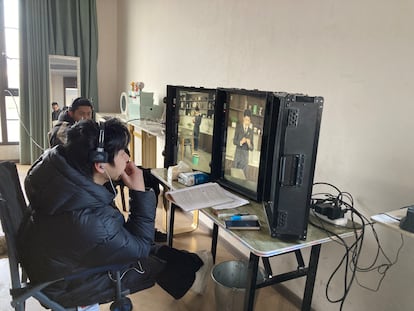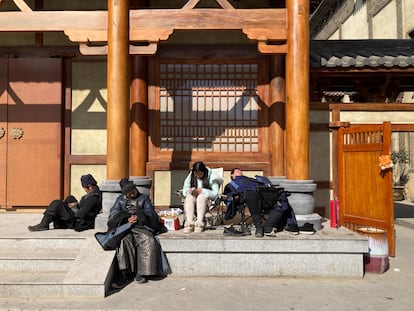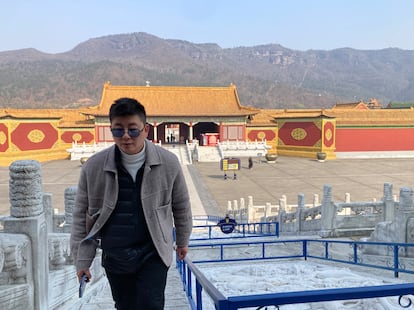Inside China’s micro-drama boom: How one-minute episodes are taking cellphone viewers by storm
In 2024, the revenue of this industry, which boasts over 500 million users in the country, surpassed box office earnings for the first time


In a corner of the rooftop, the sun’s rays play over the actor’s straight bangs. He’s young, dressed sharply, and holds a letter in his hands. As he reads, it’s clear the news isn’t good (for him). He pulls out a lighter, burns the letter, and lets it drop to the ground, where smoke and ashes rise. He gazes off into the distance, heartbroken. “Cut!” A few moments later: “Filming!” The scene is repeated almost identically, with three cameramen capturing the action from just a meter away from the actor’s youthful face. The cameras are angled 90 degrees, capturing everything in vertical format, designed for cellphone screens. It’s all done in a rush, without pause.
It’s 9 a.m. on the set in Hengdian in Zhejiang Province, on China’s east coast, home to the country’s largest film and television studios. The crew of about 30 has been working for a couple of hours already, planning to stay until midnight. It’s the first day of shooting, and the goal is to finish the 55 episodes of this show — each running between one and two minutes — in just four days. The name of the series translates to something like Chasing His Wife, But Failing. It has a budget of 400,000 yuan (roughly $53,000), and aims to capture the attention of a young female audience. It’s a new project meant to feed into China’s booming micro-drama industry, a real cultural phenomenon.

The popularity of micro-dramas is immense: they are sparking a revolution in the way fiction is consumed. These series are made specifically for cellphones, and are produced on an industrial scale. With mini-episodes lasting between one and three minutes, they captivate viewers with cliffhangers and constant twists to keep them hooked. They are highly addictive. There are period dramas, thrillers, and romantic tales. The micro-dramas cater to a fragmented, fast-paced life. They can be watched on the subway, in the bathroom, or during a coffee break. Typically ranging from 50 to 100 episodes, the first ones are often free, with viewers paying a small fee for each subsequent episode. Other models include flat rates, VIP bonuses, and small fees to remove ads.
This craze is recent, emerging around 2020 in connection with video apps like Douyin (the Chinese counterpart to TikTok). It has expanded rapidly, with numerous apps offering an endless array of titles. The micro-drama industry now generates astronomical figures. In 2024, revenues soared to 50.44 billion yuan (approximately $6.8 billion), surpassing box office earnings for the first time, according to the China Network Broadcasting Service Association. By June, the number of users had reached 576 million, according to the Statistical Report on the Development of the Internet in China.

In the words of Shi Hengyang, the young 25-year-old director of Chasing His Wife..., who takes a break between each scene, the secret lies in both tempo and content. “It has to be engaging,” he explains. He has been making micro-dramas for two years, and admits he has lost count of how many he’s worked on.
Newcomers and downgrades
Hengdian, where the filming takes place, has become a mecca for micro-dramas and a magnet for hopefuls who come to try their luck. On set, there is everyone from dancers to a construction worker playing a Chinese emperor. Zhou Qing, a 34-year-old producer who has become disenchanted with the genre, explains that the grueling production process is typically staffed by two types of people: “Newcomers who want to make movies and those who have been downgraded from cinema.”

By 2024, the city is expected to host about 1,500 such shoots, according to Hengdian World Studios, the company behind them. Sets can be found all over the city, including a near life-size reproduction of the Forbidden City. Some refer to it as China’s Hollywood, although it lacks the glamour of the famed movie mecca. There are no hilltop mansions or Walk of Fame, only dusty streets lined with production company offices, equipment rental warehouses, and prop and costume suppliers.
Director Yu Honglin enters a small room at the Mofang Film production company. The table is covered with scripts (one titled The CEO Who Becomes My Secretary) and actors’ CVs. On the screen, he shows a trailer for his next release: a chaotic blend of acrobatic leaps, sword fights, and destructive energy blasts. The protagonist, he says, is a lone swordsman traveling the world to save it. The micro-dramas is a mystical fantasy — one of the most popular genres — featuring characters with superpowers or semi-divine abilities who engage in Kung Fu-style combat: a form of storytelling unique to China.

Interest from TikTok
The production is meticulously planned. Yu compares it to a film production. With a budget of 1.8 million yuan (nearly $240,000), it is one of the top-tier micro-dramas. The series will feature 80 episodes, totaling 120 minutes. It is set to premiere on January 29, just after the Chinese New Year — one of the most coveted release dates — on the Hongguo platform, launched in 2023 by ByteDance, the parent company of TikTok, to host micro-dramas. It has 120 million active users.
“Before, they were low-quality productions,” says Yu. Now, Chinese internet giants have recognized the potential and are raising the bar. They want “more professional’ work,” says the filmmaker. They are handling substantial investments, platform collaborations, and renowned actors. “They want there to be no difference with cinema.”

Director Yu is 34 years old. His hair is cut in a marine style, and he wears a Prada jacket and a belt with a massive Gucci buckle. He has been in the industry for 15 years. Yu began his career in martial arts, studying Kung Fu at a Shaolin temple. He initially worked as a stuntman and aspired to become an actor. Over time, he took on various roles before being given the opportunity to direct, catching the wave of the new trend. “It was 2023, and suddenly everyone was making micro-dramas,” he says. His company has produced “50 or 60″ in just two years, though he’s unsure of how many he’s directed himself: “Dozens.”
In the wake of this phenomenon, Chinese companies are now looking to expand globally. Some platforms, accessible outside of China, are already offering translated Chinese micro-dramas. Bytedance launched its own app, Melolo, for Southeast Asia at the end of 2024. Reelshort, backed by Chinese giants Tencent and Baidu, is the largest micro-dramas platform in the United States. Chinese production companies are already creating content in English, and Hengdian Studios has even formed alliances to drive this international push.

“The real battle hasn’t even begun yet,” says Winnie Tang, founder of Hangzhou- and New York-based Spring Reel. She has produced, among others, the micro-drama Forbidden Desires: Alpha’s Love, filmed in the United States with local actors, but with a Chinese director and key crew members. According to the company, it has grossed over $10 million. It will be intriguing to see how this Chinese phenomenon integrates with the global market — whether its Saturday afternoon TV movie-like plots, filled with betrayal and high-flying fights, will resonate, or whether they will evolve into something uniquely their own. In China, Tang notes, the audience is “predominantly female.” In Europe, however, she adds, “due to various factors,” the format’s acceptance is still “quite limited.”
Alexander He, from the international business department at Hengdian World Studios, believes 2025 will be a year of growth: “Big companies are starting to get involved. They’ve smelled the benefits.”

Meanwhile, the streets of Hengdian are filled with stories like that of Zhang Er, a 31-year-old former English teacher turned micro-drama actor, with more than 1.7 million followers on Douyin. The videos he records of himself eating on set have become quite popular. Two years ago, he decided to change his life. After watching internet celebrities share their stories from Hengdian, he arrived in the city with almost nothing. He started as an extra, and after taking an acting course, he found his way into micro-dramas. His first shoot required working 18 hours a day for three consecutive days. “They don’t have a big budget,” he says.
Today, micro-dramas account for 99% of his work. They support him financially, though he earns more on Douyin. More importantly, they serve as a stepping stone to something bigger. At the top is the cinema; at the bottom: micro-dramas. However, he isn’t particularly fond of the format: “There is no art in them; most of them are like junk food. They make you addicted so you’ll pay to watch the next episode.” Unlike in films, he notes, the acting style is exaggeratedly dramatic. People enjoy it because they project their own lives onto the stories. “It alleviates the suffering of real life,” he admits. He has already participated in nearly 100 shoots. Last month landed his first leading role.
Sign up for our weekly newsletter to get more English-language news coverage from EL PAÍS USA Edition
Tu suscripción se está usando en otro dispositivo
¿Quieres añadir otro usuario a tu suscripción?
Si continúas leyendo en este dispositivo, no se podrá leer en el otro.
FlechaTu suscripción se está usando en otro dispositivo y solo puedes acceder a EL PAÍS desde un dispositivo a la vez.
Si quieres compartir tu cuenta, cambia tu suscripción a la modalidad Premium, así podrás añadir otro usuario. Cada uno accederá con su propia cuenta de email, lo que os permitirá personalizar vuestra experiencia en EL PAÍS.
¿Tienes una suscripción de empresa? Accede aquí para contratar más cuentas.
En el caso de no saber quién está usando tu cuenta, te recomendamos cambiar tu contraseña aquí.
Si decides continuar compartiendo tu cuenta, este mensaje se mostrará en tu dispositivo y en el de la otra persona que está usando tu cuenta de forma indefinida, afectando a tu experiencia de lectura. Puedes consultar aquí los términos y condiciones de la suscripción digital.








































